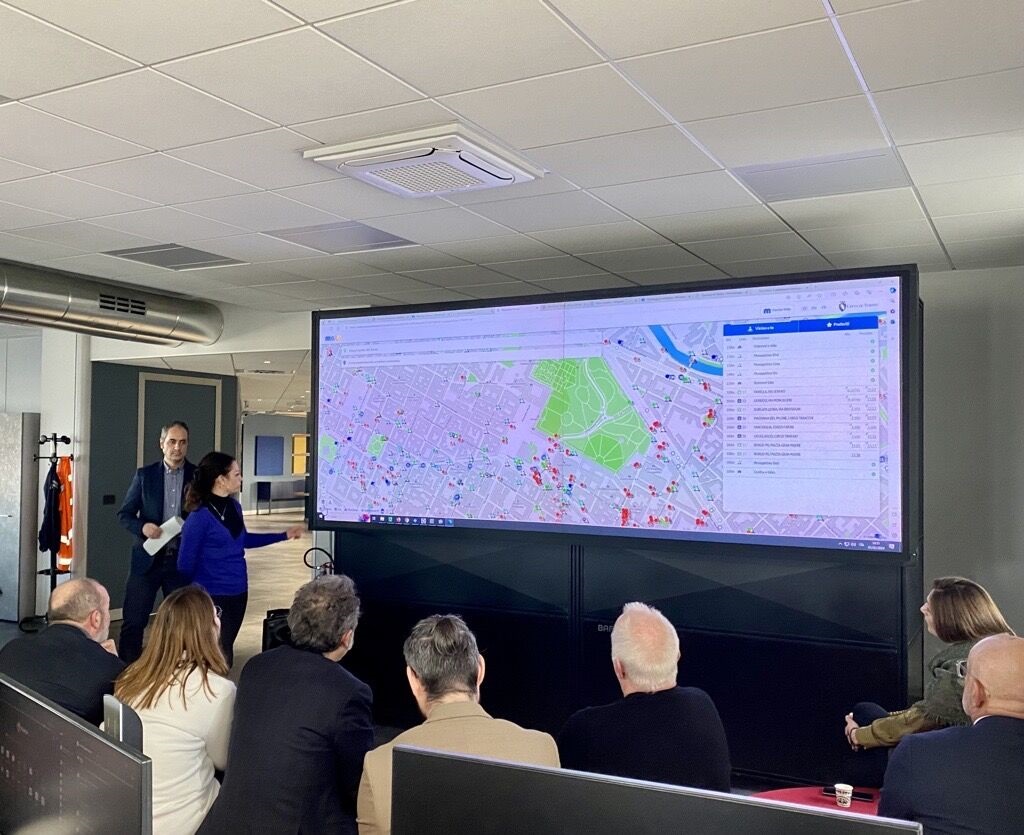How data is key to achieve sustainable transport goals: DATA4PT experts meet in Turin
Early February 2024, the DATA4PT consortium, follower partners and PT stakeholders gathered in Turin, Italy, for a Consortium meeting and workshop on EU standards implementation, hosted by 5T as DATA4PT implementing partner.
With presence of the European Commission[1], the Italian Ministry of Infrastructure and Transport[2], Italian Public Transport Authorities[3] and Operators[4] as well as authorities of 9 EU Member States[5], the consortium and partners[6] discussed the learnings of implementing standards, facilitating passenger information and journey planning. These elements constitute the foundation of multimodal and seamless mobility, making these discussions held under the DATA4PT umbrella essential to advance cross-border mobility in Europe.
As presented by the partners, implementing the EU data exchange standards again proved to be a way forward to provide quality data to foster interoperable real time passenger information services, booking and smart ticketing solutions. This easy access to public transport is key to achieve sustainable transportation goals.

Learnings from DATA4PT partners
At the meeting, representatives from (Norway, Italy, Denmark, Czech Republic, Austria, Sweden, France, Portugal) shared how they have their National Access Points (NAPs) operating. Most of those countries started their work on building NAP for multimodal data from scratch 4 years ago, when the project started. Now (beginning of 2024) all of them have operational National Access Points, either as data repositories or metadata catalogues, directing potential data consumers to data owners. Almost half of them they have also integrated this work with equivalent platforms for road traffic data (relevant to other Delegated Regulations like RTTI), so to create a single access point for mobility data.
In addition, exchanges showed that there has been a great increase in the data published in NeTEx, while data in SIRI is also available. Thanks to more exchange and initiatives such as DATA4PT, there is much more knowledge being shared between stakeholders about NeTEx and SIRI. More and more stakeholders got informed and look forward to the direction of native implementation of the standards, starting to make the necessary investments. National projects on integrated ticketing, passenger information systems including accessibility data (for example facilities for mobility impaired persons), and in general on MaaS, led to investigate and choose Transmodel based standards as the most suitable available technical solutions to overcome interoperability challenges. Finally, the knowledge acquired by DATA4PT helped partners to consult their Ministry and other stakeholders and to raise awareness in national level.
However, not all member states are on the same page of implementation. The starting point of each country determined the evolution of Delegated Regulation implementation and led into different approaches how to deal with the adoption of the standards between the countries. On the other hand the added value of the implementation of the standards is not so evident for all stakeholders. It very much depends on the type of the stakeholder, its role (for example authority, operator or other) , its size (big or small organisation), its functional scope (one transport mode, many transport modes etc.)
Best practices and experience exchange with Italian Stakeholders
The Torino meeting was a great opportunity to exchange the learnings from DATA4PT partners with transport authorities and operators from Italy and vice versa. Italian stakeholders share their experience on projects such as “MaaS for Italy” and other initiatives that they have in the pipeline (i.e. mobility observatory) where the data exchange standards are needed. The participants exchanged their point of view of the existing state of the art of the adoption of NeTEx and SIRI (Transmodel based standards), their concerns regarding the added value and the resources needed, giving also recommendations about further implementations. They expressed the importance of avoiding conversion between data exchange formats because of the impact this approach has in data quality. Moreover, data quality reports in National Access points can help in the improvement of the available data.
Next steps for DATA4PT
In terms of NAPs and the provision of the data, MS have in their pipeline to take actions to further increase the number of data feeds in SIRI and NeTEx format and to further engage the data providers.
Also, quality of data proved an important topic, and it was discussed how tools like the DATA4PT Validation Tool can be key to advance data quality. The availability of tools that check real-time feeds shared with SIRI format should also be under consideration.
Finally, collaboration between countries to align and to work together on transversal projects is a prerequisite to make the data interoperable
DATA4PT needs to carry on filling the know-how needs for the next months up to June and prepare the continuation of the necessary support stakeholders in their endeavour beyond the end of the project.
[1] Representative from DG MOVE, unit B4 Sustainable and Intelligent Transport
[2] Ministero delle Infrastrutture e dei Trasporti (MIT)
[3] Representatives from Regione Emilia Romagna, Regione Liguria, Regione Piemonte, Regione Toscana
[4] Representatives of Trenitalia, Società Unica Abruzzese, Gruppo Torinese Trasporti
[5] The project consortium represents the following Member States: Austria, Croatia, Czech Republic, Denmark, France, Italy, Portugal, Slovenia, Sweden.
[6] Follower partner: ENTUR